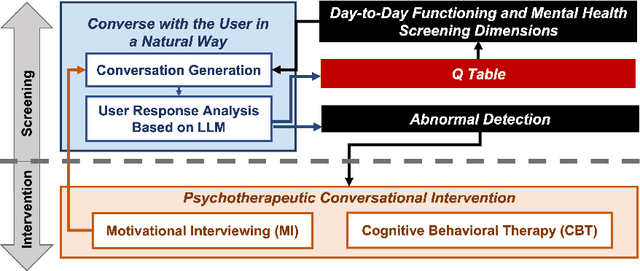Matthias Preindl
LLM-based Conversational AI Therapist for Daily Functioning Screening and Psychotherapeutic Intervention via Everyday Smart Devices
Mar 16, 2024



Abstract:Despite the global mental health crisis, access to screenings, professionals, and treatments remains high. In collaboration with licensed psychotherapists, we propose a Conversational AI Therapist with psychotherapeutic Interventions (CaiTI), a platform that leverages large language models (LLM)s and smart devices to enable better mental health self-care. CaiTI can screen the day-to-day functioning using natural and psychotherapeutic conversations. CaiTI leverages reinforcement learning to provide personalized conversation flow. CaiTI can accurately understand and interpret user responses. When the user needs further attention during the conversation, CaiTI can provide conversational psychotherapeutic interventions, including cognitive behavioral therapy (CBT) and motivational interviewing (MI). Leveraging the datasets prepared by the licensed psychotherapists, we experiment and microbenchmark various LLMs' performance in tasks along CaiTI's conversation flow and discuss their strengths and weaknesses. With the psychotherapists, we implement CaiTI and conduct 14-day and 24-week studies. The study results, validated by therapists, demonstrate that CaiTI can converse with users naturally, accurately understand and interpret user responses, and provide psychotherapeutic interventions appropriately and effectively. We showcase the potential of CaiTI LLMs to assist the mental therapy diagnosis and treatment and improve day-to-day functioning screening and precautionary psychotherapeutic intervention systems.
High-Fidelity State-of-Charge Estimation of Li-Ion Batteries Using Machine Learning
Aug 30, 2019



Abstract:This paper proposes a way to augment the existing machine learning algorithm applied to state-of-charge estimation by introducing a form of pulse injection to the running battery cells. It is believed that the information contained in the pulse responses can be interpreted by a machine learning algorithm whereas other techniques are difficult to decode due to the nonlinearity. The sensitivity analysis of the amplitude of the current pulse is given through simulation, allowing the researchers to select the appropriate current level with respect to the desired accuracy improvement. A multi-layer feedforward neural networks is trained to acquire the nonlinear relationship between the pulse train and the ground-truth SoC. The experimental data is trained and the results are shown to be promising with less than 2\% SoC estimation error using layer sizes in the range of 10 - 10,000 trained in 0 - 1 million epochs. The testing procedure specifically designed for the proposed technique is explained and provided. The implementation of the proposed strategy is also discussed. The detailed system layout to perform the augmented SoC estimation integrated in the existing active balancing hardware has also been given.
 Add to Chrome
Add to Chrome Add to Firefox
Add to Firefox Add to Edge
Add to Edge